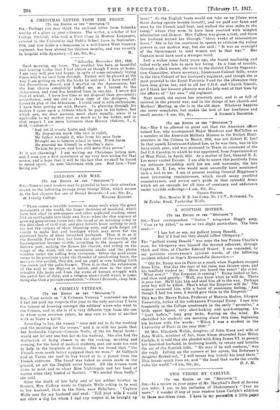A CRIMEAN VETERAN.
[TO THE EDITOR OP THE " SPECTATOR."]
Sse,—Your article on "A Crimean Veteran " reminded me that I had not paid my respects this year to the only survivor I have the honour of knowing amongst the soldiers' wives who went to the Crimea, and as she is of a very different type from the one to whom your reviewer refers, he may care to hear of another with as bravo a spirit.
According to her, the women " were sent out to do the washing . and the mending for the troops," and it is still her pride that her husband's Captain—Captain Wells, of the 1st Royal Scots— would not let any one but her do his washing. She also had the distinction of being chosen to do the cooking, morning and evening, for the band of medical students, sent out none too soon 1,o help in the hospitals at Scutari. She too found that " the French were much better equipped than we were." At Gallipoli and at Varna she used to buy bread at ls. a pound from the French canteens. The bread was baked in ovens made in the ' ground, all art the English never learnt. All the women went down to meet and to cheer Miss Nightingale and her band of nurses when they handed at Scutari. " We needed them badly," she said.
• After the death of her baby and of her soldier brother in Scutari, Mrs. Callery wrote to Captain Wells asking to be sent to her husband, then in the lines, near Balaclava. " Captain Wells sent for my husband and said: ' Tell your wife I would not allow a dog for whom I bad any respect to be brought up here! ' So the English boats would not take us up [there were three daring spirits besides herself], and we paid our fares and went by the French snail boat, and walked the nine miles to the camp," where they seem to have been received with mingled admiration and dismay. Mrs. Callery was given a tent, and there her husband nursed her through " three weeks of intermittent fever." She is far too courteous in speech to criticize the ruling powers in our modern way, but she said: " It was an oversight of the Government to send women out to that war." Her Captain must have used a stronger word.
Left a widow some forty years ago, she learnt machining and toiled early and late to earn her living. In a time of trouble, through a slack season, she went to the district Charity Organiza- tion Committee, whose secretary, Lieutenant-Colonel Selfe, wrote to the then Colonel of her husband's regiment, and though she is most grateful to the Royal Patriotic Fund for the allowance they have long given her, and to all her C.O.S. and Church friends, yet I think her keenest pleasure was the help sent at that time by the officers of " her own " old regiment.
Next month she enters her ninetieth year, and is as full of interest in the present war, and in the doings of her church and Mothers' Meeting, as she is in the old days. Whatever happens she never complains, but snakes the best of her loneliness and


































 Previous page
Previous page